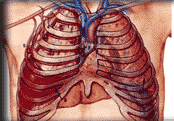Bronchial carcinoma, or lung cancer, occurs in several forms. The most common causes of lung cancer are smoking and asbestos. This web site has focused on the most lethal of the lung cancers-mesothelioma. Not every asbestos-related lung cancer, however, is a mesothelioma. Other thoracic carcinomas, such as adenocarcinoma, are also caused by exposure to asbestos.
A great deal of attention has been paid to the relationship between smoking and lung cancer. Indeed, many people automatically assume that relationship. It is therefore important to understand that while smoking is certainly a potential cause of lung cancer, it is not the sole cause of lung cancer in humans. Statistics have shown that cigarette smoking alone increases the risk of lung cancer by a factor of 10 or so; heavy asbestos exposure alone increases the risk of lung cancer by a factor of 5 or so; and the combination of the two independent carcinogens increases the risk factor by about 50 times.
Thus, you do not merely add the risks posed by asbestos to the risks posed by cigarette smoking. The combination of asbestos and smoking multiplies the risk by an unquantifiable, but significantly greater, factor. This relationship is what is referred to as the "synergistic effect" of smoking and asbestos exposure. In short, one plus one does not equal two-it equals five or more.
Like mesothelioma, there is a latency period between the time that a person is exposed to asbestos and the manifestation of a disease such as lung cancer. The latency period for asbestos-related lung cancer is typically 20-40 years. There appears to be no specificity of cell types, as various reports have linked all types of cancers of the lung to asbestos. Moreover, asbestos-related bronchogenic carcinoma has occurred in asbestos exposed individuals even in the absence of radiological evidence of asbestosis. However, a case of this nature would typically require additional supportive evidence, such as the presence of asbestos bodies in the lung tissue, pleural changes and/or pathologically demonstrated interstitial fibrosis in order to attribute the lung carcinoma to asbestos exposure.
What are the Clinical Signs of Lung Cancer?
In general, the clinical features of asbestos-related lung cancer depends upon the state of the tumor when detected. Early detection enhances the prospect of surgical care. Symptoms can include the following:
- Cough
- Chest pain (usually in later stage)
- Difficulty breathing
- Chest x-ray detection of new mass. A tumor may not be visible on a chest x-ray until it is at least 1-0 cm in diameter.
- In its late stages, typical symptoms, signs and syndromes of advanced carcinoma emerge.
Management of an asbestos-related lung cancer depends largely on the staging of the tumor. Early diagnosis and surgical resections of the tumor increase the survival rate. The presence of severe associated asbestosis, however, can affect surgical intervention. Additionally, radiation and chemotherapy may be helpful in the overall therapeutic program.
Where Do I Go From Here?
After diagnosis, it is important to understand your treatment options. Your doctor or oncologist will provide you with information on the treatments that are available to you.
It is also important to know about your legal rights. If you have an asbestos-related lung cancer, or any other asbestos-related disease, you were most likely exposed to asbestos. Many of the manufacturers of asbestos insulation products knew for decades that asbestos was hazardous, yet made a business decision not to warn people of those hazards. As a result, you may have a right of recovery against those manufacturers, which can help defray the costs of treatment and provide compensation for your pain and suffering.
For information on the legal implications of asbestos-related lung cancer and other asbestos-related diseases, please visit our Know Your Rights section.
For general information on available treatments and protocols, please visit our Treatment Options section. In addition, the Boston area is home to some of the world's finest hospitals and doctors who specialize in treating lung cancer, mesothelioma, asbestosis and similar asbestos-related diseases. Our [Articles and Resources] page contains links to help you learn more about and contact some of those facilities and doctors.

